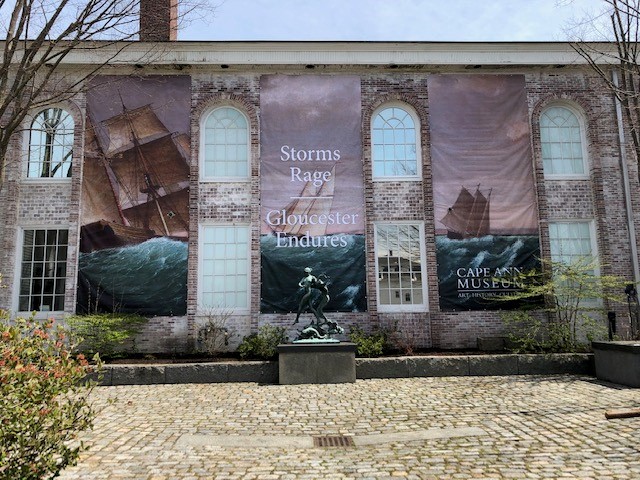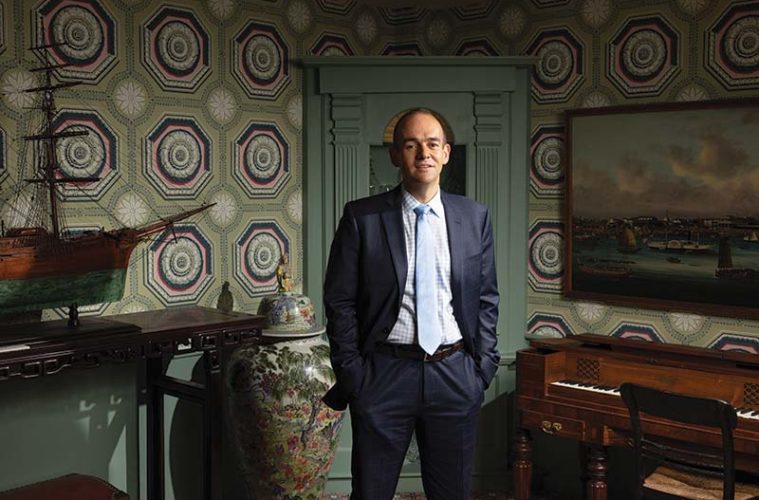The first time Oliver Barker visited the Cape Ann Museum, 20 years ago, he was a tourist. He and his wife, whose Gloucester roots go back five generations, went to see a chisel that had belonged to her great-grandfather, who had worked in the region’s thriving granite industry.
Barker, today a Wenham resident, was enchanted even then with the museum’s deep sense of place. But he could not have known at the time that he would one day end up as the institution’s director, helping guide it through an expansion, a global pandemic, and its evolution into the digital age. “It was not foreseen, but very much welcome,” he says, sitting in his Gloucester office.
Barker, who was born and raised in Australia, has always been immersed in art and culture. His grandmother, a painter, gave him his first easel (which he still has today). His father is a professional sculptor and his mother taught crafts to elementary school students. He and his brother—who is now a professional cellist—were always encouraged to express themselves through music and art.
And, indeed, Barker started out his professional career as a maker of art. He studied painting and printmaking at the Royal Melbourne Institute of Technology. After graduation, he got a job in the education department at the Peggy Guggenheim Collection in Venice, and kept painting, inspired by the celebrated city.

His work, however, eschewed the stereotypes and overexposed landmarks of Venice, focusing instead on the everyday details of the place: dishes drying in a rack, the play of light and shadow through a window grille, the strike plate of a much-used matchbox. They are dynamic with color and light, often treading the line between the abstract and the figurative.
Along the way, however, he realized that, as much as he enjoyed painting, what really mattered to him was being around art. He took a position with the Josef and Anni Albers Foundation, a Connecticut-based nonprofit that promotes the arts and supports working artists. He took to his work organizing exhibits, and, after a decade with the foundation, returned to Melbourne to earn a master’s degree in arts and cultural management.
When he returned to the United States, he began a job at the Museum of Fine Arts in Boston, where he worked for four years, before being named director of the Cape Ann Museum in early 2019.
Growing and adapting
In Gloucester, he was thrown immediately into the thick of things. Just a few months in, he oversaw a nationally acclaimed exhibition of 50 paintings by renowned artist Winslow Homer, who often visited and painted Cape Ann. The event drew some 30,000 visitors in just eight months, Barker says, a record for the museum. The museum’s expansion onto a new campus, the Cape Ann Museum Green, was also underway when Barker stepped into the position; he shepherded it to completion both on time and on budget.
The most unexpected challenge he has faced has been, of course, the COVID-19 pandemic, which forced Barker and his staff to fundamentally rethink how the museum could connect with the community and to accelerate plans to put more material online. The museum launched the CAM Video Vault, a collection of archival video lectures, as well as CAM Connects, a newsletter that offers bits of history and culture, organized around themes including lighthouses and the Cape Ann sea serpent.
And there’s plenty more to do: As the museum heads toward its 150th anniversary in 2025, the goal is to renovate the back half of the museum.
When asked what it is about art that has compelled him throughout his career, Barker points, for example, to a recent outdoor community art installation at the museum’s satellite campus. Artist Maia Mattson set up a sinuous net of twine mounted on wooden posts and placed baskets of local salt marsh hay along its length. Visitors were asked to weave bundles of the hay into the net, emulating a process conservationists are using to restore local marshes with sheaves of hay.
It was a piece about climate change and about the interplay of human and natural processes in the landscape, exactly the kind of commentary and connection to important issues Barker loves to see in art.
“I love that art provides that opportunity for self-expression,” he says. “It provides an opportunity to really engage around ideas.”
Learn more about the Cape Ann Museum at capeannmuseum.org.

